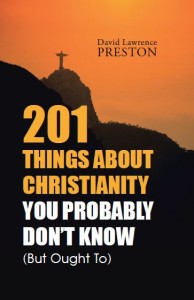If you live in a European country, or one which used to governed by a European colonial power, the chances are that the Christian religion impacts on all areas of your life whether you are a believer or not.
In the country of my birth, England, Christianity is actively followed by a tiny fraction of the population, about 5% depending on how you define ‘actively’, and only 2% attend church regularly. But it makes its presence felt everywhere. Every village, even the smallest, has a church, although most attract barely enough people to make up a cricket team most Sundays, and the majority of these are long past taking to the field.
Yet, despite the fact that it is not subject to any form of democratic control, the Church of England (Anglican Church) is an integral part of the UK’s system of government. The monarch (unelected) is its Supreme Governor; its Archbishops and bishops are chosen by the Prime Minister (who, unlike, say, the US, French or German presidents, is not directly elected by the people); and its senior bishops (unelected) sit in the Upper Chamber of Parliament, the House of Lords (which is appointed, not elected). The electorate don’t have any say – it’s the way it is, and it would take a revolution to change it.
Ironically, Roman Catholics, who have recently overtaken Anglicans as the largest Christian denomination in the UK based on active church membership, are barred from holding certain offices or marrying into the Royal Family. Heaven knows what would happen if one of them wanted to marry a Muslim!
Furthermore, Christian ideas are guaranteed a special place in the media, since the (unelected) governors of our revered national broadcaster, the BBC, are charged by law with delivering a specified minimum amount of Christian material. There’s a ‘Prayer for the Day’ and ‘Thought for the Day’ on the radio every morning, both predominantly Christian, and several hours of programming on a Christian theme every Sunday, such as the ‘Sunday Service’ and ‘Songs of Praise’.
Then, of course, the Church is wheeled out on state and military occasions. When dead soldiers are brought back from foreign wars, Church of England clergy (unelected) are there to pontificate on the tragedy of it all and lead the mourning. They’re there in their cassocks at times of national crisis and celebration, often with members of the government and Royal Family prominent in their congregations alongside celebrities of one sort or another.
Churchmen not only make their opinions known on matters of social policy, economics, medicine, science, international affairs and so on, but also sometimes insist they have the right to override the law of the land, for instance over the implementation of equality and diversity legislation on gay marriage and adoption.
The Christian religion also has its grip on the country’s educational system. All state schools are required to have a daily act of worship, which generally means Christian. In addition, a significant proportion of schools obtain a proportion of their funding from either the Church of England or Roman Catholic Church in exchange for a seat on the Governing Body and influence over recruitment and the curriculum. Faith schools have been strongly encouraged by the government in recent years.
So there’s no escape, not even for people who are nonreligious, which is the majority of us. Which begs the questions: Where do Christians and other religious people get their legitimacy? Do their ideas stand up to scrutiny, and why do they deserve such prominence? How true is their ‘truth’? Does mainstream Christianity still have anything useful to offer in the 21st Century other than a general exhortation to behave well and be nice to each other?
And why – in a supposedly democratic country – does the political influence of this implausible 1st Century philosophy seem immune to challenge?
©David Lawrence Preston, 22.8.2016
Follow me on Facebook and Twitter @david_l_preston
Balboa Press, 2015


